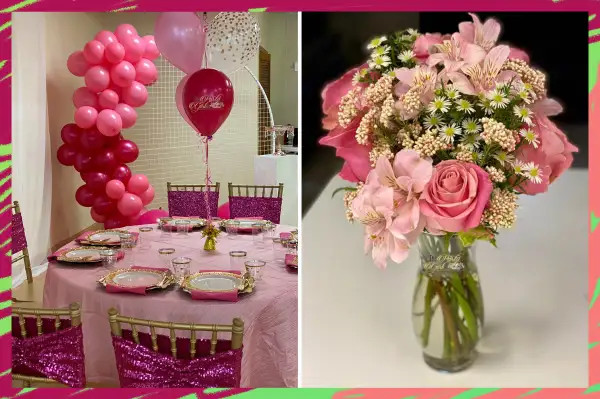How I Saved My Small Business: A Black Wedding Planner Helps Connections Bloom in Quarantine

January 2020 was 31-year-old event planner Donesha Benson’s biggest month yet.
Her Minneapolis-based business, The Party Girl, raked in $14,000 in revenue, and she was on track for a busy spring. Between April and June, every weekend was booked with corporate gatherings, graduation parties, weddings, and other celebrations.Then Benson’s bread and butter—gathering people—became a public health risk due to COVID-19, and it tanked her projections.
Benson’s business doesn’t have any full-time employees—she hires independent contractors to assist her at events—but she does have three sons who depend on her.
“Our expenses didn’t stop just because there’s a pandemic,” she says.
Benson says she’s applied for (but hasn’t yet received) emergency funding to stay afloat, including a small business emergency grant in her county, an SBA economic disaster loan, and the payroll protection plan. So when social distancing requirements prevented her from operating business as usual, she had to get creative.
She found an unexpected business solution in a personal problem in early May.
“I’m super close with my grandma, but I hadn’t been able to visit her through the pandemic because she’s high risk,” she says. “So I thought, what’s a way I could show her I’m thinking about her? I decided to send her flowers.”
Know when to ask for help
With Mother’s Day approaching, Benson realized her pain point was universal. Who wasn’t missing a physically distanced loved one? So she linked up with a wholesale florist in Minneapolis, taught herself how to arrange bouquets with live stems (she had only arranged artificial flowers for past events), added a floral delivery option to her website, and advertised on her social media accounts. To her surprise, orders for flower arrangements came rolling in: On Mother’s Day weekend alone, Benson made $2,200 in floral sales.
“If I had been better prepared, I think I could have doubled that,” she says. “I had no idea the demand would be so high.”
Knowing how much to charge customers—especially in a new industry—isn't always intuitive.
Benson launched The Party Girl, a “one-stop shop” for parties that includes an event space, in 2016. For the first two years of her business, Benson says she hardly broke even, largely because she undercharged her clients. “At first, I was only charging $500 for a 50-person party,” she says. “I thought I had to low-ball myself because I was new to the industry, and I didn’t know if people would take me seriously.”
In 2018, an industry mentor encouraged Benson to up her rates — that $500 party became a $2,000 event — and she finally became profitable.
This time around, Benson found a mentor in her floral supplier. “She educated me about the cost of flowers, how to mark them up for retail, and how to add in my labor so I’d profit,” she says.
In May, Benson says she made $5,500 selling and delivering floral arrangements, $500 shy of what she normally makes when she’s planning and hosting events. When we spoke mid-June, she was on track to exceed an average month’s revenue.
Stick to what you know
New bookings are trickling in, but there's no telling how long it will take for business to go back to normal. So until Benson starts seeing January-level revenue again, she's using floral arrangements to fill the gaps in her income.
“I like the fact that flower arrangements are still within my industry — it’s just another skill I get to add on to be a one-stop shop for clients,” she says.
Benson encourages a similar approach for fellow entrepreneurs who may be struggling to find a way forward during the Coronavirus pandemic.
“You don’t necessarily even have to go outside your industry,” she says. “You just have to figure out a new lane in your industry that gives you the same creative outlet, so you’re doing the same thing in a different way.”
Give back wherever you can
The death of George Floyd, who was killed by a Minneapolis police officer just after Memorial Day, hit home for Benson.
“The situation becomes personal when you’re a mother of Black sons,” she says. “At any given moment in the future, that could be my son.”
As soon as she heard the news of Floyd’s death, Benson knew she wanted to donate flowers to his memorial service. She had never arranged flowers for a funeral before, so she partnered with her wholesaler to design the arrangement.
As a Black business owner, Benson says she sometimes struggles to be taken seriously. “You really have to prove your credibility and that you’re good at what you do," she says.
Floyd's memorial was an opportunity to express her own grief, while bringing comfort to his family.
“It wasn’t like I saw it as a big opportunity to put my brand out there or get accolades,” she says. "I just wanted to do my part.”
More from Money:
How I Saved My Small Business: A Swanky Coffee Shop Pivots to Toilet Paper and Cheetos
How I Saved My Small Business: A Colorado Brewery Taps Into an Old-School Pastime